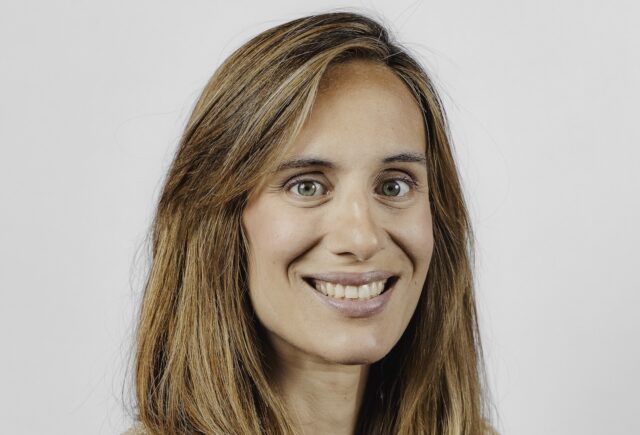Launching an asset management firm is not for the faint-hearted and particularly if you try starting a firm in the middle of a global pandemic.

In short
- V-Square is an American quantitative global asset management firm with a sustainability twist.
- The firm has set up ESGCentral, which compares and standardises available investor data.
- The analytics tool is available to non-asset management clients.
However, this is exactly what Mamadou-Abou Sarr and Habib Moudachirou did in Chicago in 2020 when they launched V-Square Quantitative Management.
Sarr, with almost 20 years of experience in asset management, always knew he would start his company one day where he could combine his experience with his passion. He had always liked to work at the intersection where finance and sustainability meet. He wanted to start a firm where corporate social responsibility, ESG, stewardship and investments are inseparable.
He worked with Moudachirou at HSBC Asset Management, where they gained much of their ESG and quant experience, and this is how V-Square came about.
The thing that sets V-Square apart from many other quant managers is their focus on sustainability, which only 15 years ago was seen as potentially incompatible by many working in asset management.
Sarr argues that quant is all about processing data and ESG has increasingly become about data – the two work well together if you have the right experience.
“Too much data”
ESG and impact investing are growing at an ever-increasing pace, but the lack of standardisation among rating and data providers continues to be the Achilles heel of the industry. As the industry matures investors are increasingly looking for customised solutions that are aligned with their values.
“I have been involved in ESG investing for much of my career and I have seen the analytics grow in both availability and in complexity,. Fifteen years ago, the main battle was the disclosure of ESG metrics.”
In 2019, 90% of S&P listed companies published sustainability reports, according to the Governance & Accountability Institute. “Today the issue is not lack of data but – often – too much data,” Sarr said.
He noted that V-Square is not reinventing the wheel but rather using a quant focus to make the data comparable and standardised for better investment decisions and ultimately boosted returns.
A depository of all ESG data
The key idea with ESGCentral is to integrate an investor’s different data sources for genuine comparison while it is also possible to add filters and V-Square’s proprietary scoring. Considering the regulatory pressures, not least within the EU, asset managers and asset owners are in dire need of standardisation tools to help them with sustainability analytics, Sarr said.
“The conundrum we were trying to solve was to identify a subset of E, S and G factors that are financially relevant because the fact is that not all ESG data is equally relevant when investing.”
They started by building an open architecture data platform in-house to compare and back-test a range of ESG scoring methodologies and key performance indicators across data providers, such as MSCI, Bloomberg, ISS and others.
“Double materiality is our anchor and we identified three themes in our approach,” Sarr told Impact Investor.
“The first one is climate change, which we see as a long-term macro issue as well as opportunity. The second one is the combination of human capital and technology that is needed to achieve net zero emissions.”
Double materiality means that ESG issues create risks and opportunities that are material from a financial or an impact perspective, or both. It means that under the EU Non-Financial Reporting Directive (NFRD) “companies have to report about how sustainability issues affect their business and about their own impact on people and the environment.”
Essential workers
Sarr said Covid-19 accelerated the need for putting people at the centre of corporations, as they became acutely aware of the importance of essential workers and disrupted supply chains.
The third theme V-Square has identified within double materiality is governance, which has to work in tandem with the other themes.
“Our analytics platform ESGCentral gives us the ability to source, aggregate, standardise and integrate ESG data in investment portfolios and risk models.”
V-Square starts all conversations with prospective clients with a value-based questionnaire to find out what matters most to investors, whether it is fees, carbon exposure or global standards such as the Sustainable Development Goals. This questionnaire forms the basis for a customised solution.
Beyond the ‘do no harm’ of ESG
Impact investing versus ESG is often defined as actively doing good versus doing no harm. V-Square goes beyond the usual ESG business involvement in measuring positive impact.
“We use frameworks based on revenue, product and services alignment with the Sustainable Development Goals, The Paris Accord alignment or D&I (diversity and inclusion metrics, ed)”
For the D&I metrics V-Square partnered with ISS for their unique datasets, he said, adding that he sees D&I as part of diversification. “If diversification of output such as assets is good, surely diversification of input, such as human capital, is equally valuable,” he pointed out.
Sustainable Nordics
Investors can use ESGCentral to consolidate all their ESG data from different providers but they are not obliged to use V-Square for asset management.
The interest in ESGCentral has been particularly strong in the Nordics, where V-Square hired Erik Norland from Northern Trust Asset Management as Head of Distribution. Norland and Sarr worked together at Northern Trust Asset Management and during his time there, Sarr worked with a large Swedish pension fund to develop a low carbon equity strategy in 2013.
A US quant manager having its global distribution hub in Stockholm is unusual but intentional. Sarr confirmed that this decision was driven by the region’s investors, who are among the pioneers in sustainability.
Leading impact initiatives
The popular slogan ‘built back better’, born out of the pandemic, will be tested as COP26 nears. The question is whether all these initiatives will lead to action that will genuinely address climate change and social and economic inequality in the world.
One of the initiatives that Sarr rates is The Net Zero Asset Managers Initiative, which in less than a year has grown to 128 signatories representing circa $43trn in assets under management.
“For such an initiative to deliver more tangible outcomes, signatories need to commit to work in partnership with asset owner clients on decarbonisation goals, set an interim target for the proportion of assets to be managed in line with the attainment of net zero emissions by 2050 or sooner and finally, review interim targets at least every five years with a view to ratcheting up the proportion of AUM covered until 100% of assets are included.”
“From my perspective, the most critical part will be the ongoing monitoring of outcomes versus pledges and the accountability of asset managers.”
Mamadou-Abou Sarr
EU rules address greenwashing
In addition, he believes that the EU Sustainable Finance Disclosure Regulation (SFDR) is rightly addressing the greenwashing of financial products and fostering disclosures to help investors make choices in accordance with sustainability goals.
“Now, sitting on the other side of the table, asset managers are facing a significant additional administrative burden to put processes in place and disclose information based on the SFDR Principal Adverse Impacts (PAIs) framework. We welcome the natural triage, which should favour authenticity and expertise as opposed to ESG marketing claims.”






